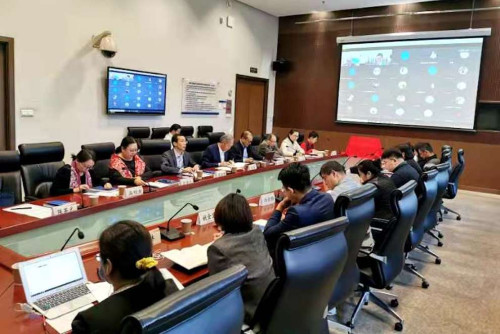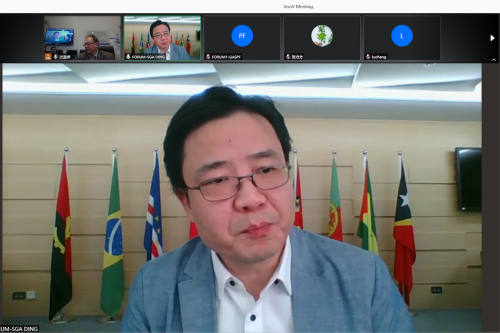The launch ceremony of the “2020 Portuguese-speaking Countries Development Report” and a seminar on the socio-economic development of Portuguese-speaking Countries post-pandemic, took place on November 25. Deputy Secretary-General of the Permanent Secretariat of the Forum for Economic and Trade Co-operation between China and Portuguese-speaking Countries (Macao), Mr Ding Tian, participated in the ceremony and delivered a speech via videoconference technology.
Mr Ding talked about the evolution and achievement of Forum Macao since it was launched in 2003, and emphasised that the University of International Business and Economics’ (UIBE) Center for Studies on China and Portuguese-speaking Countries, or CCEPLP, has been collecting suggestions on making the most of Macao’s role as a platform for economic and trade cooperation between China and Portuguese-speaking Countries, by compiling and publishing the “2020 Portuguese-speaking Countries Development Report”. The report features data on socio-economic development and potential areas for cooperation between China and Portuguese-speaking Countries. In his speech, Mr Ding said he expected the seminar would allow experts from all parties to discuss fresh development opportunities created by the “Belt and Road” Initiative, and by the development of the Guangdong-Hong Kong-Macao Greater Bay Area, in order to boost exchanges and cooperation between China and Portuguese-speaking Countries.
The “2020 Portuguese-speaking Countries Development Report,” also known as the Blue Book, analyses the socio-economic development of Portuguese-speaking Countries distributed across four continents, and their position in the global economic environment. It also provides a comprehensive overview of the achievements in economic and trade cooperation between China and Portuguese-speaking Countries.
After the launch ceremony, a seminar on the socio-economic development of Portuguese-speaking Countries post- Covid-19 pandemic, was held with representatives from the following institutions: UIBE’s Academy of China Open Economy Studies at CCEPLP; the Center for Spanish Studies, Institute of Latin American Studies, and Institute of World Economy and Politics at the Chinese Academy of Social Sciences; the Department of Portuguese at Shanghai International Studies University’s School of European and Latin American Studies; the International Exchanges Office of the China Institute of International Studies; Jinan University’s Institute for African Studies; and the Macaology Society of China.






